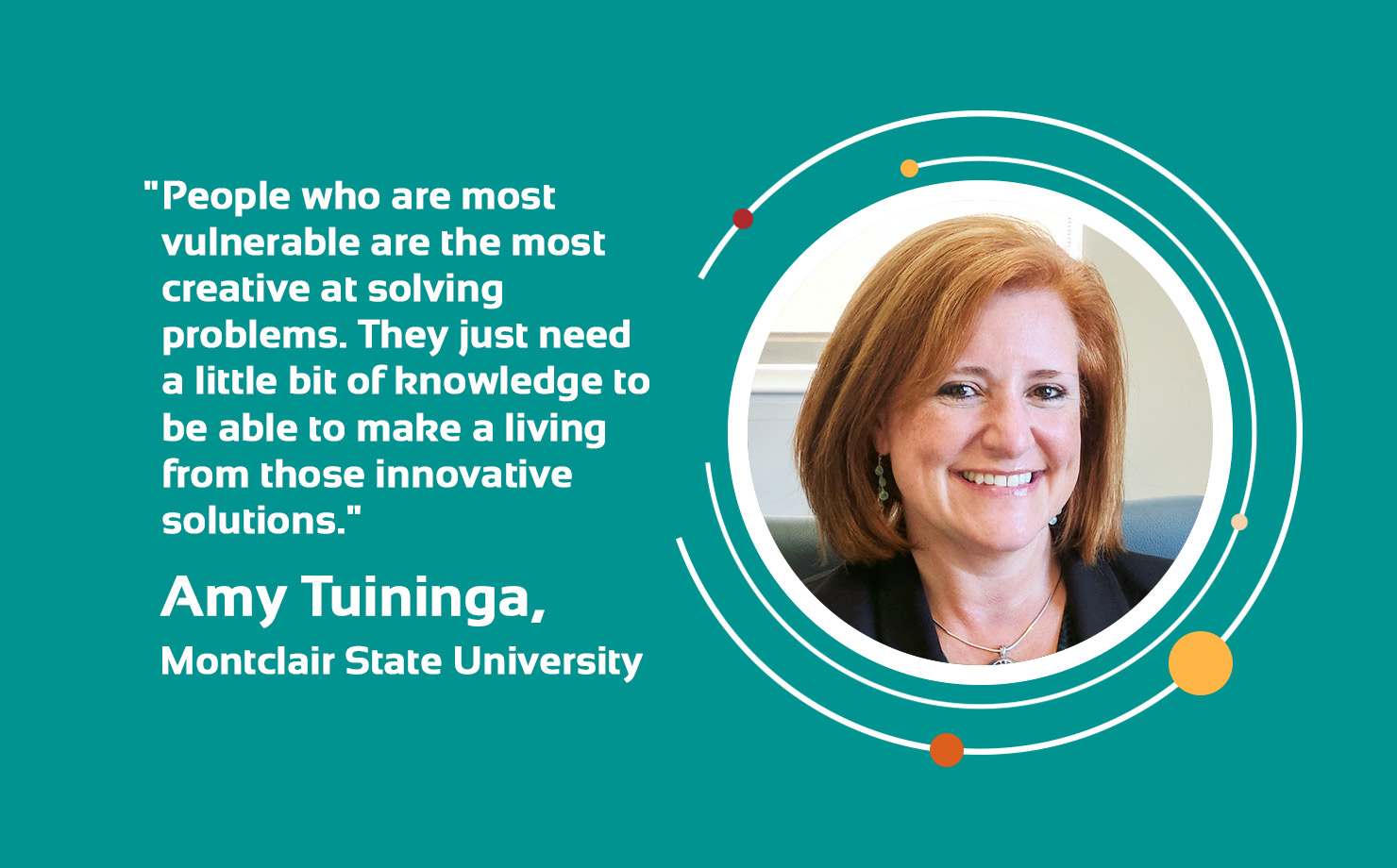
Our Faculty Spotlight series highlights educators within the VentureWell network who are doing good work—faculty members who are catalyzing change in higher education and inspiring students to impact the world through invention. This month’s spotlight is Amy Tuininga, Director of the PSEG Institute for Sustainability Studies at Montclair State University. Tuininga is determined to expand accessible educational opportunities in entrepreneurial landscapes, particularly for students traditionally underserved in STEM fields. She received a Faculty Grant in 2018 for her work developing programs that tie technology product design with sustainability practices.
how did you get interested in teaching entrepreneurship?
I began my career as an ecosystem ecologist, exploring human impacts on natural and man-made systems. From this perspective, I began co-creating and building opportunities for groups underrepresented in STEM, like first generation college students. These opportunities grew from development of partnerships between formal and informal science organizations who worked together to examine what was available and known to these students. We brainstormed how we could expand students’ knowledge from that base, making their education real and relevant. To solve sustainability problems, students needed training in entrepreneurship, which we provided as part of our Green Teams program.
what is your favorite thing about teaching?
It’s rewarding when a student first feels ownership of a project. It goes beyond the aha moment into a confidence for building a career on one’s own capabilities and interests, regardless of lack of social capital or role models in a discipline or area.
where would you like to see the field of entrepreneurship in five years?
I believe that entrepreneurship should be accessible and inclusive. People who are most vulnerable are the most creative at solving problems. They just need a little bit of knowledge to be able to make a living from those innovative solutions. The current pandemic is a tremendous opportunity to hit a reset button and be able to think through systems completely differently —food systems, supply chains, energy efficiency, planning, and use of public and office space. We should include those affected by this pandemic in the entrepreneurial opportunity afforded by a reset. New solutions should be equitable solutions.
what are the challenges you’re tackling in your work today?
I currently work in the transdisciplinary field of sustainability, which unifies multiple disciplinary frameworks smoothly. Today, we are challenged by traditional 100+ years old academic models and processes in higher education—the four year, 120 credit bachelor’s degree for instance. Some tech fields move much more quickly than a four-year period. Students in these fields will have the information they learn become irrelevant before they graduate, and many jobs do not even require a bachelor’s degree. Other fields require repeated updating to stay fresh, and they require advanced degrees. We all benefit from continued education. The question is when and how to determine if a person has achieved adequate expertise in a particular field to deserve a credential. Though institutions of higher education are typically slow to change, there is hope given how fast they have had to pivot to virtual education due to the pandemic.
what books on entrepreneurship and innovation have you been reading lately?
To build innovative educational experiences, I take note from books such as Charles Duhigg’s Power of Habit, Malcolm Gladwell’s Outliers, Arnaud Brohe’s The Handbook of Carbon Accounting, Patrick Lencioni’s The Five Dysfunctions of a Team: A Leadership Fable, and Cara Alwill Leyba’s Girl Code: Unlocking Secrets to Success, Sanity, and Happiness for the Female Entrepreneur.
what’s your most useful classroom activity or assignment?
We offer team-based learning for all majors working to address real-world sustainability challenges, designing in-line water treatment systems, water reduction in manufacturing, food systems that address urban food insecurity, and more. These group projects pair engineering and entrepreneurship majors with those majoring in humanities, communications, and social sciences, sparking collaboration that helps build better products that everyone needs and will use. Challenging students to think creatively together can lead to useful innovations. We also celebrate failures and successes—cheering for and rewarding students that share their failures to help our students realize that it is okay to fail on the road to success. Failing and trying again helps students build STEM literacy and develop products that are beneficial to humans and the planet.
Our Faculty Grants program helps fund and support your innovative ideas to create new or transform existing innovation and entrepreneurship courses and programs. Hear from other faculty about how our program positively impacted their work.